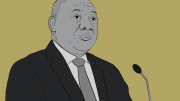A tale resembling a James Bond film is playing out on a global scale thanks to the work of whistleblower Edward Snowden. Snowden has once again released documents implicating the American National Security Agency (NSA), which now stands accused of spying on foreign leaders around the world.
One of Snowden’s leaked documents details an NSA signals intelligence program codenamed “Stateroom.” According to the document, the project involves “covert [signal intelligence] collection sites located in diplomatic facilities abroad,” including Canadian embassies. The surveillance equipment is allegedly hidden on consulate property “in false architectural features or roof maintenance sheds.”
Also involved in the latest scandal is German Chancellor Angela Merkel. Snowden’s information leaks claim that the NSA monitored Merkel’s phone. In a statement, Merkel was translated saying, “I’ve made it clear to the US president that spying on friends is not acceptable,” adding that the trust between allies must now be renewed.
Merkel has received expressions of support from other global leaders, including Dutch Prime Minister Mark Rutte. Finnish Prime Minister Jyrki Katainen told the BBC that “We have to get clarification of what has happened and we also need a guarantee that this will never happen again, if it has happened.”
Reports indicated that the U.S. was eavesdropping on millions of French phone calls, Italian phones and Internet, and, according to Panorama magazine, the Vatican – a claim that the NSA has said is simply “not true.”
Italian Prime Minister Enrico Letta used the words “inconceivable and unacceptable” to describe the accusations. However, George MacLean, professor of political studies at the University of Manitoba, said he was not surprised.
“Governments actually do this all the time. What is not so much said is just how frequently,” said MacLean. “[Governments] have rights to act in ways that other groups, actors, or individuals simply don’t. It doesn’t mean that ethically or morally it’s without criticism, because spying on anyone would be ethically and morally suspect, but in the name of national security [ . . . ] or of the protection of citizens, governments do all sorts of things, including spying on their own friends and neighbours, all the time as a means of gathering information.”
MacLean described Merkel’s response to the spy revelations as “diplomatic.”
“I think that fundamentally Angela Merkel is not losing too much sleep over the Americans spying on her country. I do think, though, that politically and diplomatically she has to say something about it, [ . . . ] because [to remain silent] would be a tacit acceptance at best, or she might be avoiding her responsibilities at worst.”
MacLean further explained, “No one is going to come right out and say ‘look, this is an accepted political practice of nations, even nations that are friendly toward one another,’ because to do that would almost be to admit [to] something so obvious to us but at the same time almost forbidden.”
“We don’t speak of this because to admit it would mean that someone else would be able to say, ‘Well, how could you do such a thing?’ when in fact all countries are pretty much involved to some degree,” said MacLean.
Now that many of the NSA’s tactics are being revealed, MacLean questioned whether or not people would reconsider their privacy and rights.
He pointed out that over two decades ago, individuals could maintain a high degree of privacy in their lives. According to MacLean, this privacy is almost unattainable today.
“That’s something that’s just accepted. We recognize that we could piece together at least a brief bio of just about anyone by looking on the Internet and knowing some basic information, and it’s become easier as well for that information to be available for countries.”
“[Thus] espionage and spying has taken on a whole new realm of activity. It has also taken place in a period where people are far more aware than they ever were before about the vulnerability of privacy.”



